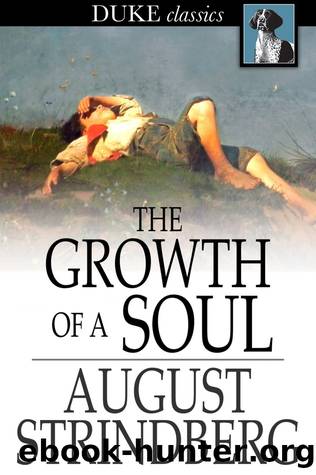The Growth of a Soul by August Strindberg

Author:August Strindberg
Language: eng
Format: epub
ISBN: 9781620137888
Publisher: Duke Classics
Chapter VIII - The "Runa" Club
*
(1870)
The Upsala of the sixties showed signs of the end and dissolution of a period which might be called the Boströmic.[4] In what relation does the philosophic system which prevails in a given period stand to the period itself? The system seems like a collection of the thoughts of the period at a particular point of time. The philosopher does not make the period, but the period makes the philosopher. He collects all the thoughts of his period and thereby exercises an influence on it, and with the close of the period his influence ends. The Boströmic philosophy had three defects; it wished to be definitely Swedish; it came too late; and it wished to outlive its period. To attempt to construct a purely Swedish philosophy was absurd, for that meant trying to break loose from the connection with the great mother-stem which grows on the Continent and only sends out seeds towards the Northern peninsula. The attempt came too late, for time is necessary to construct a system, and before the system was constructed, the period had passed. Boström, as a philosopher, was not, as it were, shot out of a cannon. All knowledge is collecting-work, and is coloured by the personality of the collector. Boström was a branch grown out of Kant and Hegel, watered by Biberg and Grubbe, and finally producing some offshoots of his own. That was all. He seems to have derived his fundamental principle from Krause's Pantheism, which itself was an attempt to unite the philosophy of Kant and Fichte with that of Schelling and Hegel. This eclecticism had been already attempted by Grubbe. Boström first studied theology, and this seemed to have a hampering effect on his mind when he wrote about speculative theology. His moral philosophy he derived from Kant. To call him an original philosopher is provincial patriotism. His influence did not reach beyond the frontiers of Sweden, nor did it outlast the sixties. His political system was already antiquated in 1865, when the students out of reverence for the philosopher, had still to declare, conformably to his textbook, that the representation of the four estates was the only reasonable oneâa doctrine which was subsequently contradicted in the college lectures.
How did Boström come by such an idea? Can one draw an inference from the accidental circumstance that he, a poor man's son from Norrland, came into too close touch with King John and his court, in his capacity of tutor to the princes? Could the philosopher escape the common lot of generalising in certain respects, from his own predilections and current time-sanctioned ideas? Probably not. Boström as an idealist was subjectiveâso subjective that he denied reality an independent existence, declaring that, "to be is to be perceived (by men)." The world of phenomena therefore, according to him, exists only in and through our perceptions. The error of the deduction was overlooked, and it was a double one. The system rested on an unproved assumption, and had
Download
This site does not store any files on its server. We only index and link to content provided by other sites. Please contact the content providers to delete copyright contents if any and email us, we'll remove relevant links or contents immediately.
Walter Benjamin and the Actuality of Critique by Carlo Salzani(375)
Delphi Collected Works of Karl Marx (Illustrated) by Karl Marx(369)
Mortal Subjects by Christina Howells(315)
Philosophy of Mind: 50 Puzzles, Paradoxes, and Thought Experiments by Torin Alter & Robert J. Howell & Amy Kind(304)
Bushido: The Soul of Japan by Inazo Nitobe(285)
Wisdom For A King by Kapil Gupta(268)
Albert Camus by Foley John(233)
The Little Book of Stoic Quotes: Philosophy for a Meaningful and Courageous Life by Phil Van Treuren(225)
The SPCK Introduction to Simone Weil by Stephen Plant(224)
Nietzsche's Philosophical Psychology by Riccardi Mattia;(221)
The Wall Speaks by Jerr rreJ(215)
Jean-Paul Sartre by Churchill Steven; Reynolds Dr. Jack;(208)
Notes of an Underground Humanist by Chris Wright(193)
The Philosophy of Hope; Beatitude in Spinoza by Alexander Douglas(183)
Love Your Life by Dominque Bertolucci(180)
Jacques Ranciere by Deranty Jean-Philippe;(179)
Seeing Through Christianity: A Critique of Beliefs and Evidence by Bill Zuersher(165)
The Stoic Creed (Stoicism Book 24) by William Leslie Davidson(162)
Complete Works of Aeschines by Aeschines(146)
